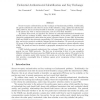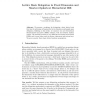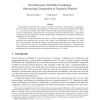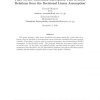105
click to vote
CRYPTO
2010
Springer
15 years 2 months ago
2010
Springer
Secure two-party authentication and key exchange are fundamental problems. Traditionally, the parties authenticate each other by means of their identities, using a public-key infr...
104
click to vote
CRYPTO
2010
Springer
15 years 2 months ago
2010
Springer
At the heart of many recent lattice-based cryptographic schemes is a polynomial-time algorithm that, given a `high-quality' basis, generates a lattice point according to a Ga...
115
click to vote
CRYPTO
2010
Springer
15 years 2 months ago
2010
Springer
Following Gennaro, Gentry, and Parno (Cryptology ePrint Archive 2009/547), we use fully homomorphic encryption to design improved schemes for delegating computation. In such schem...
CRYPTO
2010
Springer
15 years 2 months ago
2010
Springer
CRYPTO
2010
Springer
15 years 2 months ago
2010
Springer
We present a technique for delegating a short lattice basis that has the advantage of keeping the lattice dimension unchanged upon delegation. Building on this result, we construct...
104
click to vote
CRYPTO
2010
Springer
15 years 2 months ago
2010
Springer
Motivated by the question of basing cryptographic protocols on stateless tamper-proof hardware tokens, we revisit the question of unconditional two-prover zero-knowledge proofs fo...
CRYPTO
2010
Springer
15 years 2 months ago
2010
Springer
CRYPTO
2010
Springer
15 years 2 months ago
2010
Springer
CRYPTO
2010
Springer
15 years 2 months ago
2010
Springer
This paper presents a fully secure functional encryption scheme for a wide class of relations, that are specified by non-monotone access structures combined with inner-product rel...
CRYPTO
2010
Springer
15 years 2 months ago
2010
Springer
Abstract. A cryptographic primitive is leakage-resilient, if it remains secure even if an adversary can learn a bounded amount of arbitrary information about the computation with e...







